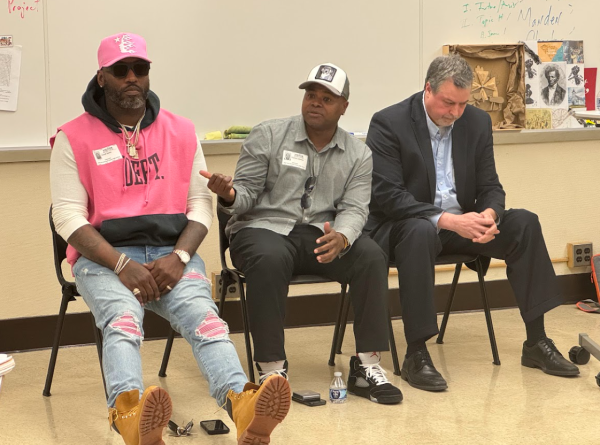Gender equity sought in OPRF biz classes
Teachers in the Oak Park and River Forest High School business program noticed a troubling trend a few years ago: the number of girls in their classes appeared to be dwindling.
OPRF’s business classes have historically been predominantly male—typically 30 percent female and 70 percent male, according to Matthew Prebble, a teacher and chair of the Business Education Division.
But in 2019, the gender gap appeared to have widened. A Sports and Marketing class had no girls, and several other business classes had fewer than five girls, Prebble said.
Prebble described it as “a real shame, and a real problem that we have all of these barriers preventing us from making female-identifying students feel interested and safe within our spaces.” With his colleagues in the Business Division, he began working on strategies to make the program more welcoming and inclusive to all genders.
“Whilst we have a specific focus on increasing female-identifying students at the moment,” he said, “we truly believe in all forms of equity and inclusion, which inherently means we want our classes to be regarded as safe, welcoming and engaging spaces that value business students of all gender identities.”
Toward that end, Business Division teachers pulled together every female student from all of the business classes for a 50-minute workshop in 2019. Local female entrepreneurs and professionals spoke about women in business and mentored OPRF girls through a creative marketing mini-project, Prebble said.
Prebble and his colleagues also tried to figure out why there weren’t girls in business classes. In 2019 they surveyed more than 100 female OPRF students and discovered that many girls didn’t know the classes existed, weren’t sure what business classes were about and assumed that classes were disproportionately male.
The pandemic interrupted their efforts, but this year business teachers are continuing to promote business classes to girls.
For example, Prebble said the business department changed the class “Sports and Marketing” to ”Principles of Marketing” to make it seem more gender-neutral. On Oct. 31, the Business Division hosted an event called “Young Women in Business” for all freshman through junior female-identifying students. The full-day workshop was designed to spark their interest in the business world, according to Prebble’s comments on “Hear it From a Huskie,” a podcast hosted by Laurie Fiorenza, Ed.D., assistant superintendent for student learning.
Cristin Lombardi, a teacher in the Business Division, said they also invited two senior girls to talk about how they navigate male-dominated classes. The goal was to show younger girls that, even in male-dominated classes, ”They can do it,” Lombardi said. “They can have a seat at the table.”
A recent visit to Lombardi’s Accounting and Investment class began with the chatter of the 19 boys as the three girls present in class that day sat quietly. Lombardi explained there’s a lot of male energy in the class, and it sometimes dominates.
Cassidy Sturgeon, the only sophomore in the class, said, “When I first got into the class, I was like, really scared because it’s like a bunch of like, seniors and all guys.” But her fear didn’t last long, and now she encourages other girls to try the class. “It’d be great if other girls could try this out and see how fun and easy this is,” Sturgeon said.
To put the girls at ease, Lombardi said that on the first day of class she put the girls next to each other. “They like their female packs, right? We like our little tribes,” she said. “And if they don’t find that quickly in the class, they can feel more withdrawn from the content.”
Lombardi said she tries to bring the female perspective into whatever connection she is making in class. For example, she tries to educate the class on the “pink tax”–the tendency for products marketed to women to be more expensive–and bring in female examples.
Shenice James, a senior in the class, said it is nice to sit with a girl at her table. She said there’s a “different type of connection, like a woman connection.”
Having a female teacher also made her feel more connected to the subject matter, she said. “I definitely feel more inspired by (Lombardi) to do business in general.”
While she sometimes feels intimidated, the feeling has only strengthened her determination to succeed in business. “It definitely made me want to go into this field even more because I see that there’s not a lot of women in it,” she said. “And there’s not a lot of women of color in this class.”
Later in the class, Lombardi asked Sophia Atkin, a senior, to do a problem on supply accounts on the board. Atkin politely declined, yet the hands of six boys shot up. In her classes, Lombardi believes girls are less likely to speak up if they are unsure, yet the boys do so all the time.
Research supports her impression. A 2003 study described in The Atlantic magazine, “The Confidence Gap,” showed men are more confident and study less, whereas women are less confident and study more. David Dunning, a psychologist at Cornell University, and Joyce Ehrlinger from Washington State University, gave male and female college students a quiz and asked them beforehand to rate their knowledge of the subject on a scale from 1 to 10.
The women rated themselves an average of 5.8, while the men gave themselves a 7.1. Their average for the ten-question test was very similar as women got an average score of 7.5 and men got a 7.9.
Lombardi, who studied business in college, said that many of the men in her classes were confident because they had taken business-focused classes in high school. “It took a lot of mental strength and perseverance to tell myself, ‘No, I can do it. I’m just as smart as them,’” she said.
Overcoming the gender gap in business is a big challenge that requires team effort, Prebble said. There is a responsibility for the department, division, counselors, administration, parents and male students to break down the barriers that are in place.
While he isn’t expecting gender parity any time soon, he hopes every year to make business classes more inclusive. Girls are “just as capable as their male counterparts, if not more so…especially in maturity, creativity, and collaboration,” he said.









